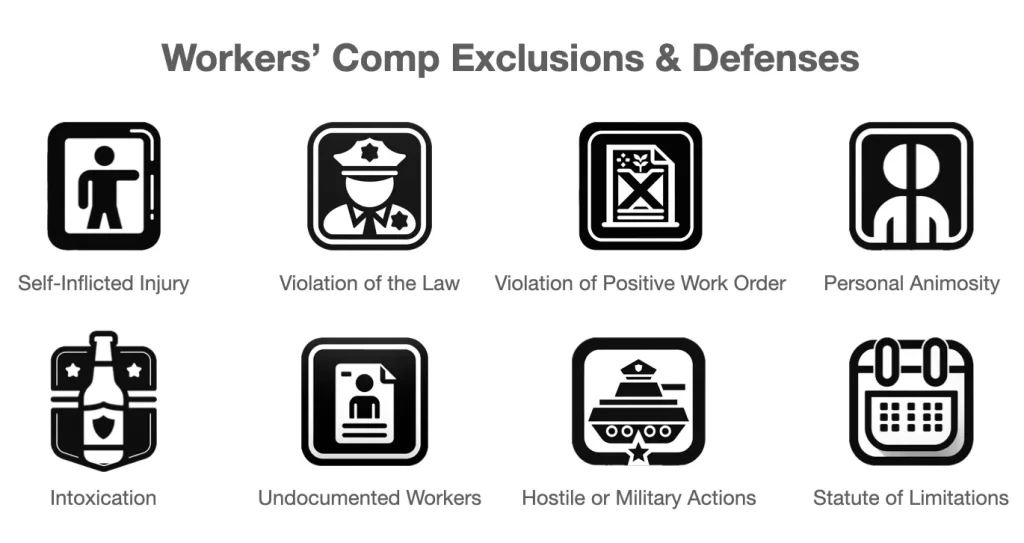Exclusions and Defenses to Workers’ Compensation Claims
Workers’ comp serves as a crucial safety net for injured workers, offering financial support for their recovery. However, not every injury or illness automatically receives coverage. Understanding the concept of affirmative defenses and exclusions can empower injured employees with the knowledge to navigate these situations.
Below, we will examine each category closely and use real-world examples. We hope to clarify some of the complex aspects of PA workers’ compensation laws.

Exploring Affirmative Defenses
In affirmative defenses, an employer can legally deny workers’ compensation benefits under specific conditions. These defenses play an important role in determining who is eligible for workers’ compensation benefits.
The Case of Self-Inflicted Injuries
What qualifies as a self-inflicted injury in the workplace?
Not all injuries at work constitute accidents. Sometimes, an employee might engage in actions that purposely cause harm to themselves. This includes clear and obvious cases of self-harm. It also covers situations where an employee’s negligence or willful disregard for safety results in injury.
For instance, ignoring prescribed medical dosages, leading to an overdose. This would not qualify as a work related injury, despite that the injuries occurred at work.
Case Study: The Overdose Incident
John, a warehouse employee, has prescription medication for a work-related back injury. Despite clear instructions on dosage, John deliberately took more than prescribed, hoping to speed up his recovery. This resulted in an overdose and led to hospitalization.
The employer discovered John misused the medicine on purpose. This enabled the employer to use the affirmative defense of self-inflicted injury. The employer denied further compensation for the overdose-related medical care.
Injuries from Violating the Law
How does breaking the law impact workers’ compensation?
Injuries sustained during the engagement of illegal activities often do not qualify for compensation. This applies to both minor and major violations. For example, driving under the influence at work or engaging in illegal drug use.
Case Study: The DUI Delivery
Samantha, a delivery driver, decided to drink over lunch before making her afternoon deliveries. She crashed the delivery truck and suffered serious injuries.
The investigation revealed her intoxication level was above the legal limit, leading to a DUI charge. Samantha broke the law at the time of the accident. This enabled the employer to successfully deny her workers’ compensation claim. The employer succeeded on the grounds of the affirmative defense, relating to breaking the law.
Violations of Positive Work Orders
What happens when employees ignore specific work orders?
Disobeying direct work orders can lead to denied compensation for employees injured on the job. Especially orders designed for safety.
The employer must prove three things to be successful in denying compensation. One, the employer must prove that the employee had awareness of the rule. Two, the rule must specifically relate to job safety. Lastly, the injury must result directly from the violation.
Case Study: The Forbidden Area
Alex sustained an injury after entering a restricted area of the construction site. The employer had the area clearly marked. The employer also told Alex the hazardous conditions of the area made it off-limits .
Despite previous warnings, Alex believed he could take a shortcut through the area. Alex did not receive compensation for the resulting injury because he violated a positive work order.
Exclusions: Common Workers’ Compensation Defenses
Exclusions represent times when workers’ compensation insurance does not apply. Often, exclusions occur either based on the nature of the incident or the status of the individual involved. Insurance companies use these exclusions when an injured worker files a claim. This may limit the ability of the employee to succeed in their workers’ compensation claim.
Personal Animosity: Workplace Disputes and External Conflicts
Conflicts that stem from personal issues, whether inside or outside the workplace, fall outside the scope of workers’ compensation. This means the workers’ comp system does not take on the burden for incidents unrelated to job duties.
Case Study: The Personal Feud
Emma and Sarah, coworkers at a retail store, had a longstanding personal feud. One day, it escalated into a physical fight at work, resulting in injuries. Workers’ comp did not cover the employees’ injuries. This depicts a matter of personal conflict, not related to their job duties .
The Role of Intoxication in Workplace Injuries
Injuries that result directly from an employee’s intoxication or drug use do not qualify for coverage. This exclusion highlights the importance of workplace safety and personal responsibility.
Case Study: The Intoxicated Fall
Mike, a factory worker, arrived at work under the influence of alcohol. While working, he fell from a platform and sustained multiple injuries. Tests confirmed his intoxication at the time of the accident. Mike did not receive benefits, given the clear evidence that his impaired state caused his fall.
@thwesq Intoxication is a complete defense to a Worker’s Compensation claim under section 301(a) of the Pennsylvania Workers’ Compensation act. Don’t drink and work. ##workerscomp##dontdrinkanddrive##besafe##lawyersoftiktok##lawyer ♬ original sound – Tom Wing
Undocumented Workers and Their Rights
The status of undocumented workers under workers’ comp laws often surprises both employees and employers. Undocumented status does not automatically exclude an individual from receiving benefits. However, it can affect the benefits from continuing.
Case Study: The Undocumented Worker’s Dilemma
Ed, an undocumented worker, suffered a hand injury while operating a machine. Initially, he received workers’ compensation benefits for his medical care and lost wages.
But, when Ed’s doctor medically cleared him for light duty, the fact that he could not legally work in the U.S. complicated his claim. The employer argued that Ed could not return to work because of his legal status and not because of his injury. This led to the suspension of Ed’s benefits.
Hostile Attacks and Military Actions
Workers’ comp does not cover injuries or deaths resulting from military actions or hostile attacks. This provision reflects the unique nature of these events, which fall outside the scope of typical workplace accidents.
Case Study: The Unforeseen Attack
A warehouse suffered damage because of military activity nearby. This caused injuries to several workers. The workers’ injuries did not qualify for workers’ comp because the incident, directly related to a military action. Thus, the injured workers could not seek compensation through the workers’ compensation system.
Final Thoughts
The statute of limitations creates another limit from filing a workers’ compensation claim. You typically only have three years from the date of your injury to file a claim petition. Success in a workers’ compensation case requires a broad understanding of the affirmative defenses and different exclusions.
Employees should always know the boundaries of their workers’ comp coverage and understand their rights. At the same time, employers should know how to properly manage their responsibilities.
For eligibility questions, contact us today: 215-609-4183. Use our settlement calculator for a lump sum value for your case. You can also find out your benefit rate.



